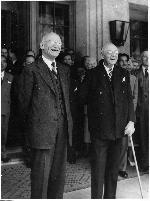In March 1949 in Bern, in one of his early political speeches outside Germany, he mentioned the promising attitude of some French leaders and the new outlook in the Benelux countries. He concluded, 'In large sectors of the German public, there is a profound conviction that only a union of the countries of Western Europe can save this old continent. If France behaves wisely and generously towards Germany, she will render historic service to Europe.'16

In the same month Robert Schuman, now France's Foreign Minister, dined with Louis Boucquey and two of Buchman's close colleagues, Philippe Mottu and John Caulfeild. According to their reports, Schuman talked at length about the Atlantic Pact, which was about to be signed, describing it as a defective diplomatic instrument if confined to the political and military spheres: 'We must reach the masses so that the Pact will be sustained not only by the atom bomb, but by a change in the way of life of the Western world. In the economic field we have the Marshall Plan; in the political and military field the Atlantic Pact. Now we need to give fresh ideological content to the life of the millions of Europe.' Then he added, 'The Germans need a lot of courage to work with the French. It is no good being sentimental about these things. We all need to reach a deep inner change in order to find the solutions to our major problems.'17
This so closely coincided with Buchman's own thought that Boucquey asked Schuman if he would write a foreword to the French edition of Buchman's speeches, which had appeared in English under the title Remaking the World. Schuman accepted, although he remarked, 'I have not yet crossed the Rubicon.'18 The opportunity to write the foreword came when a mild attack of flu gave him a brief respite in February 1950. By that time he had met Buchman again, and he was later to say that reading the book gave him 'a glimpse of the meaning of Frank Buchman's life, past and present'.19 Certainly, his foreword expressed Buchman's aims and methods during these years with extraordinary accuracy. After stating that 'thus far statesmen have only been moderately successful in "remaking the world"', he wrote that if Buchman had presented some new scheme for public welfare or just another theory he would have remained sceptical, but that, on the contrary, 'What Moral Re-Armament brings us is a philosophy of life applied in action'. Then in three succinct sentences he outlined Buchman's programme: 'To begin by creating a moral climate in which true brotherly unity can flourish, overarching all that today tears the world apart - that is the immediate goal. The acquisition of wisdom about men and affairs by bringing people together in public assemblies and public encounters - that is the means employed. To provide teams of trained people, ready for the service of the state, apostles of reconciliation and builders of a new world - that is the beginning of a far-reaching transformation of society in which, during fifteen war-ravaged years, the first steps have already been made.'
376
Photo: Robert Schuman (left), Foreign Minister of France 1948-1953, with Buchman at the Caux Conference, 1953.
©Peter Sisam ABIPP/MRA Productions